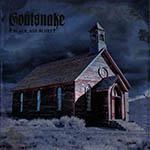
Goatsnake Black Age Blues
(Southern Lord Recordings)
“At the end of the day/As the light begins to fade… Y’know, tomorrow’s not promised to anyone.”
A Southern-drenched muck launched from guitarist Greg Anderson’s fret board travels at a hiker’s stride beneath singer Pete Stahl, the song Another River To Cross introducing the first piece of recorded anything from sludge metal pioneers Goatsnake in about eleven years. With acoustic help from Slint’s David Pajo, the influence of folk, blues and gospel that courses through Goatsnake’s new album, Black Age Blues, is quietly addressed in the album’s opening act before Anderson plugs in, his six-string strangulation an immediate gift.
Fifteen years since the band’s sophomore release, which was 2000’s Flower Of Disease, Black Age Blues continues in the Goatsnake tradition of Southern roots rock and blues and the application of sonic impurity. Though perhaps too clean at times, Stahl’s vocal has character. He croons and shouts, bellows and howls, a showman’s throat the band’s most melodic component, matching with intensity the groundwork laid by Anderson, drummer Greg Rogers and bassist Scott Renner.
Anderson, who would otherwise be playing opposite drone maestro Stephen O’Malley in Sunn O))), paints with a heavy brush, every bristle sopping, every amplified droplet viscous. While the rhythmic uptick of Elevated Man, Coffee & Whiskey and Jimi’s Gone enable Anderson to revel in the rockist glory of extended jams and built-up transitions, the compelling and close-to-grotesque vocabulary he employs in House of the Moon and, most especially, Graves resonates in ways that are all at once exciting and menacingly dense. Stahl, who is aided at times by singers Wendy Moten, Gale Mayes and Andrea Merrit of Dem Preacher’s Daughters, keeps this significant duality stylistically cohesive.
In the way Nick Cave relished in the choral flourishes conducted throughout the Bad Seeds’ Abattoir Blues, the soul element in Black Age Blues compliments Stahl really well, his most pronounced moments lengthened by this secondary block of singers. Their refrain of “shine on” in the aforementioned House of the Moon pushes the song into gospel territory, harmonized gloriousness not too often found within the confines of an otherwise ominously positioned song. For Grandpa Jones, (which despite its opening and closing phrases keeps to a consistent pace), Dem Preacher’s Daughters enhance the arrangement, melodic touches that bolster Stahl’s vocal and also provide more of an undercurrent. With them, the track sounds richer than it might have.
The title track is as anthemic as one would expect, Goatsnake relishing in its swinging groove which is undeniably infectious. “Living, dying... in the black age…” Stahl sings as a section of momentary quiet is enjoyed before the volume returns, the song’s remaining minutes pulled into a slowed up riff-informed digression. Reduction of speed, however, doesn’t result in a loss of intensity.
Closing with the muddy imbalance of A Killing Blues, Goatsnake’s long-awaited follow-up probably shouldn’t be as good as it is. While the band’s dynamic remains familiar and reliably heavy, the signature sound not too far removed from where it was over a decade ago, Black Age Blues sounds like an album Goatsnake were excited to make. There’s not one tired moment, no obvious retreads to be heard. It’s a solid third act, making good on the promises of (many) tomorrows.
3 June, 2015 - 04:41 — Sean Caldwell